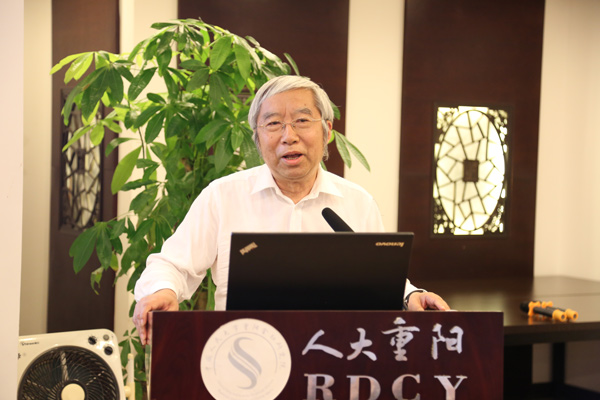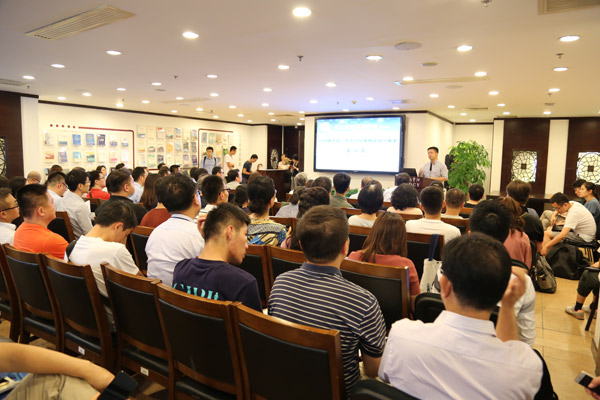Picture
Your Present Location: HOME> PictureYu Yongding: Evaluation and prospect of China-US trade friction
The trade friction between China and the US has a temporary truce, but the US has the possibility of waging investment war, science and technology war, currency war, and so on in the future. Professor Yu Yongding, member of the academic Department of the Chinese Academy of Social Sciences, said in a lecture invited by the Chongyang Institute for Financial Studies of Renmin University of China (RDCY) on June 26.

Professor Yu said that there are three main reasons for US launching a trade war against China. First, China has a large trade surplus with the US. Second, the United States believes that China does not abide by the WTO agreement. Third, the United States believes that China has unfairly acquired American technology.
With regard to the trade imbalance between China and the United States, Professor Yu said that from a macroeconomic point of view, the imbalance between domestic savings and investment will inevitably lead to an imbalance in the current account of the domestic balance of payments. If savings are greater than investment, it must be a surplus. If the United States does not solve its domestic savings problem, it will have a trade deficit with other countries, even if it does not have a deficit with China.
When talking about a country's balance of payments, we should consider it from the overall and the multilateral point of view. For China's trade surplus, the United States has benefited on the whole, but the benefits have not been fairly distributed. Therefore, the US has transformed the domestic problem of distribution into a trade dispute between China and the United States.
The United States criticized China on the basis of WTO, but according to the WTO, the United States found that there was nothing to criticize, so the United States put aside WTO clauses and turned to Section 301. Section 301 is US domestic law, and As soon as Section 301 was promulgated, it was strongly criticized by European countries, so the US Government issued an action statement in September 1994, saying actions taken under Section 301 must be in accordance with the dispute settlement mechanism of the WTO. WTO has not only rules but also a complete set of procedures for the settlement of disputes. In waging a trade war against China, the United States not only violated WTO rules, but also reneged on its 1994 government commitments.
Section 301 also accuses of China achieving its goals by wrong means. The United States believes that in the process of joint ventures, Chinese partners force US enterprises to transfer technology and steal US intellectual property rights through espionage and cyber intrusion. This is the logic of the United States imposing tariffs on China.
There are probably several fronts in the Sino-US trade war: tariff war, investment war, technology war, exchange rate war, financial war. As for the tariff war, Yu Yongding noted that it is unlikely that the tariff war between China and the United States will worsen further. There is now growing opposition for additional tariffs to China in the United States. The more increase and the higher tax rate, the more groups will be affected and the more opposition the United States will have.

He added that the Sino-US trade war has long gone beyond the scope of trade. The hot spot now is technology war. The United States oppresses China in two ways. One is to ask China to solve the so-called structural problems. Originally, China and the United States were engaged in trade consultations, but as a result, US turned trade consultation into China's structural problems. Structure problem is a basket in which problems other than trade are fully packed into "structural" basket, involving issues of state ownership, state-owned enterprises, industrial policy and various subsidies that have nothing to do with trade.
On the other hand, on the grounds of endangering US national security and violating more US laws, especially on the grounds of Iran, a technological blockade and embargo has been imposed on Chinese enterprises. ZTE is an example of sanctions against Chinese high-tech companies. There is also a temptation of kicking China out of the global value chain. The United States has recently introduced 14 technology export controls, all of which are advanced technologies that China considers important.
Against the measures implemented by the United States, first of all, China should unswervingly adhere to reform and opening up, speed up domestic reform, improve the protection of intellectual property and private property, accelerate market-oriented reform and let the market play a decisive role in the allocation of resources.
Second, we should consider reducing our dependence on other countries. Instead of pursuing an export-oriented policy, we should strive to allocate resources in accordance with the laws of the marke and focus on domestic demand and do our own work well. Thirdly, we should make great efforts to improve the ability of independent innovation. Finally, it is necessary to safeguard the principle of multilateralism, safeguard the current international order, conscientiously implement the WTO commitments, and adhere to the all-round policy of opening up.























































































 京公网安备 11010802037854号
京公网安备 11010802037854号





